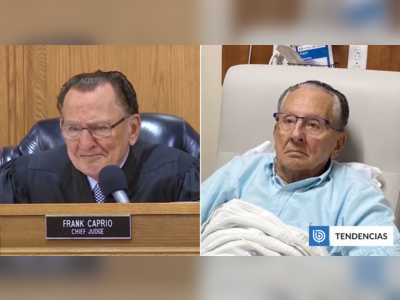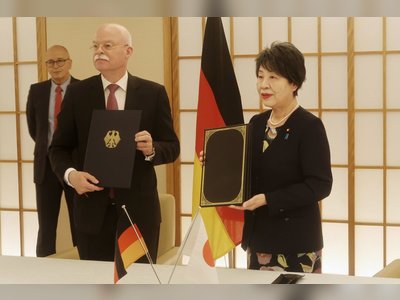
Annalena Baerbock Steps Down from Leadership Role in Green Party
The German Foreign Minister announces her decision to resign from the position of Green Party whip, citing personal reasons amid ongoing political challenges.
Annalena Baerbock, the outgoing German Foreign Minister and prominent figure within the Green Party, has announced her decision to relinquish her role as the party whip in the Bundestag.
This decision, motivated by personal reasons, signifies a temporary retreat from front-line political responsibilities.
In a letter addressed to her party colleagues and her local branch in Potsdam, Baerbock stated her desire to step out of the spotlight and not seek a leadership position within the parliamentary faction for the time being.
Baerbock's leadership tenure has been significantly tested over recent years, marked by crises ranging from international conflicts to humanitarian disasters.
Her diplomatic efforts included advocating for increased international assistance for Ukraine amid the Russian invasion, as well as working towards the release of Israeli hostages taken by Hamas and improving humanitarian conditions in the Gaza Strip.
The effectiveness of German foreign policy during her time in office remains to be fully assessed, but she has faced considerable challenges that have left visible impacts on her political stature.
The Green Party, which experienced a disappointing electoral performance with only 11.6 percent of the vote in the recent Bundestag elections, is undergoing a strategic reassessment.
Alongside Vice Chancellor Robert Habeck, Baerbock has been pivotal in the party's shift towards the political center, aiming to appeal to voters who previously supported the Christian Democratic Union under Angela Merkel.
This approach, however, proved ineffective in the latest elections, prompting discussions within the party about adjusting its policies, particularly around migration and social issues.
The left wing of the party has called for a more progressive stance on migration and a greater emphasis on social policies, while centrist members have highlighted that the party’s moderate strategy had previously driven membership growth under Habeck during the campaign.
Despite the recent electoral setback, they argue the party's losses were not as severe as those of its coalition partners.
In the aftermath of the election, Habeck took responsibility for the Green Party's performance and expressed his intention to step away from leadership roles.
Baerbock, initially considered a strong candidate to succeed him as the new whip, has now left the future of her political career open-ended.
With her departure from the race for party leadership, the current whip, Katharina Dröge from the left-wing faction, alongside her co-chair Britta Haßelmann, will continue to guide the parliamentary group.
This decision, motivated by personal reasons, signifies a temporary retreat from front-line political responsibilities.
In a letter addressed to her party colleagues and her local branch in Potsdam, Baerbock stated her desire to step out of the spotlight and not seek a leadership position within the parliamentary faction for the time being.
Baerbock's leadership tenure has been significantly tested over recent years, marked by crises ranging from international conflicts to humanitarian disasters.
Her diplomatic efforts included advocating for increased international assistance for Ukraine amid the Russian invasion, as well as working towards the release of Israeli hostages taken by Hamas and improving humanitarian conditions in the Gaza Strip.
The effectiveness of German foreign policy during her time in office remains to be fully assessed, but she has faced considerable challenges that have left visible impacts on her political stature.
The Green Party, which experienced a disappointing electoral performance with only 11.6 percent of the vote in the recent Bundestag elections, is undergoing a strategic reassessment.
Alongside Vice Chancellor Robert Habeck, Baerbock has been pivotal in the party's shift towards the political center, aiming to appeal to voters who previously supported the Christian Democratic Union under Angela Merkel.
This approach, however, proved ineffective in the latest elections, prompting discussions within the party about adjusting its policies, particularly around migration and social issues.
The left wing of the party has called for a more progressive stance on migration and a greater emphasis on social policies, while centrist members have highlighted that the party’s moderate strategy had previously driven membership growth under Habeck during the campaign.
Despite the recent electoral setback, they argue the party's losses were not as severe as those of its coalition partners.
In the aftermath of the election, Habeck took responsibility for the Green Party's performance and expressed his intention to step away from leadership roles.
Baerbock, initially considered a strong candidate to succeed him as the new whip, has now left the future of her political career open-ended.
With her departure from the race for party leadership, the current whip, Katharina Dröge from the left-wing faction, alongside her co-chair Britta Haßelmann, will continue to guide the parliamentary group.
Translation:
Translated by AI
AI Disclaimer: An advanced artificial intelligence (AI) system generated the content of this page on its own. This innovative technology conducts extensive research from a variety of reliable sources, performs rigorous fact-checking and verification, cleans up and balances biased or manipulated content, and presents a minimal factual summary that is just enough yet essential for you to function as an informed and educated citizen. Please keep in mind, however, that this system is an evolving technology, and as a result, the article may contain accidental inaccuracies or errors. We urge you to help us improve our site by reporting any inaccuracies you find using the "Contact Us" link at the bottom of this page. Your helpful feedback helps us improve our system and deliver more precise content. When you find an article of interest here, please look for the full and extensive coverage of this topic in traditional news sources, as they are written by professional journalists that we try to support, not replace. We appreciate your understanding and assistance.










